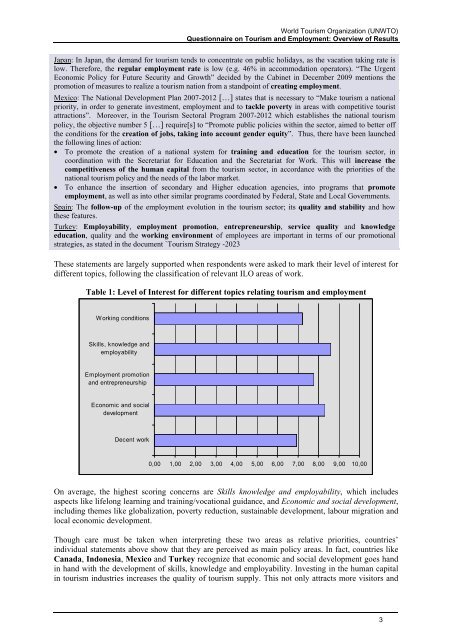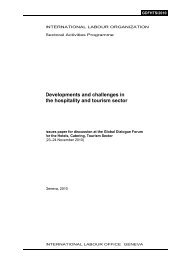Questionnaire on Tourism and Employment: Overview of Results
Questionnaire on Tourism and Employment: Overview of Results
Questionnaire on Tourism and Employment: Overview of Results
Create successful ePaper yourself
Turn your PDF publications into a flip-book with our unique Google optimized e-Paper software.
World <strong>Tourism</strong> Organizati<strong>on</strong> (UNWTO)<br />
<str<strong>on</strong>g>Questi<strong>on</strong>naire</str<strong>on</strong>g> <strong>on</strong> <strong>Tourism</strong> <strong>and</strong> <strong>Employment</strong>: <strong>Overview</strong> <strong>of</strong> <strong>Results</strong><br />
Japan: In Japan, the dem<strong>and</strong> for tourism tends to c<strong>on</strong>centrate <strong>on</strong> public holidays, as the vacati<strong>on</strong> taking rate is<br />
low. Therefore, the regular employment rate is low (e.g. 46% in accommodati<strong>on</strong> operators). “The Urgent<br />
Ec<strong>on</strong>omic Policy for Future Security <strong>and</strong> Growth” decided by the Cabinet in December 2009 menti<strong>on</strong>s the<br />
promoti<strong>on</strong> <strong>of</strong> measures to realize a tourism nati<strong>on</strong> from a st<strong>and</strong>point <strong>of</strong> creating employment.<br />
Mexico: The Nati<strong>on</strong>al Development Plan 2007-2012 […] states that is necessary to “Make tourism a nati<strong>on</strong>al<br />
priority, in order to generate investment, employment <strong>and</strong> to tackle poverty in areas with competitive tourist<br />
attracti<strong>on</strong>s”. Moreover, in the <strong>Tourism</strong> Sectoral Program 2007-2012 which establishes the nati<strong>on</strong>al tourism<br />
policy, the objective number 5 […] require[s] to “Promote public policies within the sector, aimed to better <strong>of</strong>f<br />
the c<strong>on</strong>diti<strong>on</strong>s for the creati<strong>on</strong> <strong>of</strong> jobs, taking into account gender equity”. Thus, there have been launched<br />
the following lines <strong>of</strong> acti<strong>on</strong>:<br />
• To promote the creati<strong>on</strong> <strong>of</strong> a nati<strong>on</strong>al system for training <strong>and</strong> educati<strong>on</strong> for the tourism sector, in<br />
coordinati<strong>on</strong> with the Secretariat for Educati<strong>on</strong> <strong>and</strong> the Secretariat for Work. This will increase the<br />
competitiveness <strong>of</strong> the human capital from the tourism sector, in accordance with the priorities <strong>of</strong> the<br />
nati<strong>on</strong>al tourism policy <strong>and</strong> the needs <strong>of</strong> the labor market.<br />
• To enhance the inserti<strong>on</strong> <strong>of</strong> sec<strong>on</strong>dary <strong>and</strong> Higher educati<strong>on</strong> agencies, into programs that promote<br />
employment, as well as into other similar programs coordinated by Federal, State <strong>and</strong> Local Governments.<br />
Spain: The follow-up <strong>of</strong> the employment evoluti<strong>on</strong> in the tourism sector; its quality <strong>and</strong> stability <strong>and</strong> how<br />
these features.<br />
Turkey: Employability, employment promoti<strong>on</strong>, entrepreneurship, service quality <strong>and</strong> knowledge<br />
educati<strong>on</strong>, quality <strong>and</strong> the working envir<strong>on</strong>ment <strong>of</strong> employees are important in terms <strong>of</strong> our promoti<strong>on</strong>al<br />
strategies, as stated in the document `<strong>Tourism</strong> Strategy -2023<br />
These statements are largely supported when resp<strong>on</strong>dents were asked to mark their level <strong>of</strong> interest for<br />
different topics, following the classificati<strong>on</strong> <strong>of</strong> relevant ILO areas <strong>of</strong> work.<br />
Table 1: Level <strong>of</strong> Interest for different topics relating tourism <strong>and</strong> employment<br />
Working c<strong>on</strong>diti<strong>on</strong>s<br />
Skills, knowledge <strong>and</strong><br />
employability<br />
<strong>Employment</strong> promoti<strong>on</strong><br />
<strong>and</strong> entrepreneurship<br />
Ec<strong>on</strong>omic <strong>and</strong> social<br />
development<br />
Decent work<br />
0,00 1,00 2,00 3,00 4,00 5,00 6,00 7,00 8,00 9,00 10,00<br />
On average, the highest scoring c<strong>on</strong>cerns are Skills knowledge <strong>and</strong> employability, which includes<br />
aspects like lifel<strong>on</strong>g learning <strong>and</strong> training/vocati<strong>on</strong>al guidance, <strong>and</strong> Ec<strong>on</strong>omic <strong>and</strong> social development,<br />
including themes like globalizati<strong>on</strong>, poverty reducti<strong>on</strong>, sustainable development, labour migrati<strong>on</strong> <strong>and</strong><br />
local ec<strong>on</strong>omic development.<br />
Though care must be taken when interpreting these two areas as relative priorities, countries’<br />
individual statements above show that they are perceived as main policy areas. In fact, countries like<br />
Canada, Ind<strong>on</strong>esia, Mexico <strong>and</strong> Turkey recognize that ec<strong>on</strong>omic <strong>and</strong> social development goes h<strong>and</strong><br />
in h<strong>and</strong> with the development <strong>of</strong> skills, knowledge <strong>and</strong> employability. Investing in the human capital<br />
in tourism industries increases the quality <strong>of</strong> tourism supply. This not <strong>on</strong>ly attracts more visitors <strong>and</strong><br />
3



